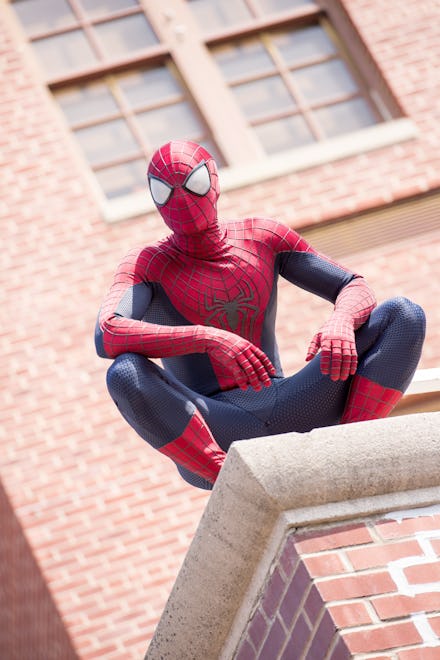The Reason Why Spider-Man Producers Flatly Refused to Make Films More Diverse

Bad news, Marvel movie fans: Your favorite angst-ridden arachnid adolescent isn't getting a diversity makeover any time soon.
The beloved comic book hero is best known as Peter Parker, the quiet, pale boy from Queens who grows up to become a web-slinging savior. But while the story's origins are decidedly white, the comic books have spawned several successful — and arguably more colorful — Spidey spin-offs. Most notable are Miguel O'Hara, a futuristic Irish-Mexican engineer (from the year 2099, to be exact), and Miles Morales, a teenager of black and Hispanic descent who lives in an alternate universe to the original Spider-Man story line. There are even female web-slingers like Jessica Drew and Julia Carpenter.
Sadly these characters are, at least under current management, stuck on the page. In a recent interview with the Playlist, Amazing Spider-Man 2 producers Avi Arad and Matt Tolmach said that the film franchise has absolutely no intentions of bringing any of Spider-Man's post-Peter Parker variations to the silver screen.
"The one thing you cannot do, when you have a phenomena that has stood the test of time, you have to be true to the real character inside — who is Peter Parker? What are the biggest effects on his life? Then you can draw in time, and you can consider today's world in many ways," explained Arad.
Image Credit: Vulture (panels from Spider-Men, art by Sara Pichelli)
The comments imply that the producers feel a minority Spider-Man would be too foreign for the franchise's fans, and that a movie starring such would make less money at the box office. There are two main flaws with Arad's reasoning, however. If comic book readers can cope with alternatives to Peter Parker, which exist alongside the ongoing original, film fans can manage the same — especially in light of the current movie market that is seemingly inundated with various takes on the Marvel Universe.
More importantly, if Arad and Tolmach really want to make films that "consider today's world," introducing a non-white Spider-Man is relevant and important.
A non-white Spidey is potentially more realistic, anyways. As Brian Michael Bendis, who has penned hundreds of Spidey stories for the comic series and created the character of Miles Morales, told Vulture recently, "If Spider-Man were created today, there's a very large percentage chance that, based on where he's living and who he is, that he would be a person of color."
Image Credit: Marvel
Spider-Man actually lends itself better than most traditional superheroes to diversity. Covered head-to-toe in Lycra, he — or she — could be anyone underneath the suit. It's one of the reasons Bendis thinks the character resonates so well across so many ages and races. Current Amazing Spider-Man actor Andrew Garfield agrees.
This isn't to say the decision would be uncontroversial. In 2010, rumors that Donald Glover could be cast as Spider-Man sparked debate across the Internet, but debate can be a good thing. As Hollywood blog noted, the casting of Spider-Man should be about the actor's talents, not his race, "about finding the right guy who can make us believe in a nerdy kid who wants to save the world."
It would be a mistake, in other words, to look at the kind of racist outcry that happened when black actor Michael B. Jordan took on the role of Johnny Storm in a Fantastic Four remake, for example, or when black actors played Rue and Thresh in The Hunger Games and decide the risk isn't worth it.
What kind of message does that send to the kids who emulate the comics in the first place?
The character of Spider-Man was groundbreaking in the 1960s for putting a teenager — usually the sidekick, not the hero — in the title role. Its current producers, who have a prominent platform for change, should respect that legacy and propel Spider-Man into the 21st century. After all, that's the real lesson of the whole, decades-old franchise: With great power comes great responsibility.